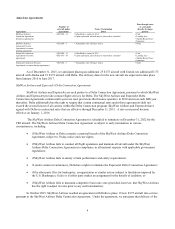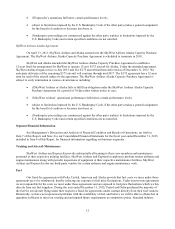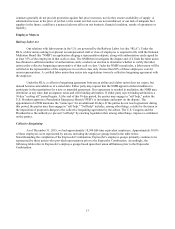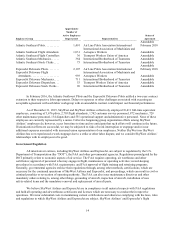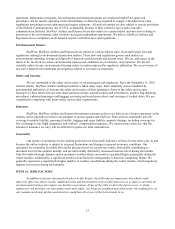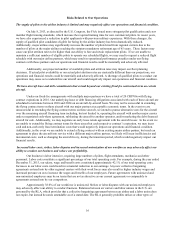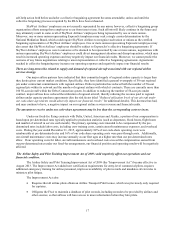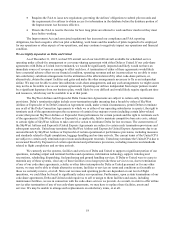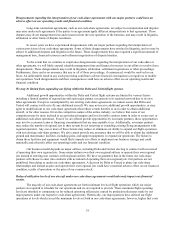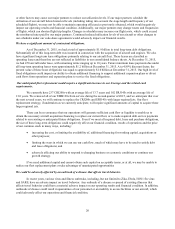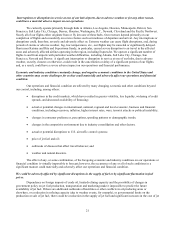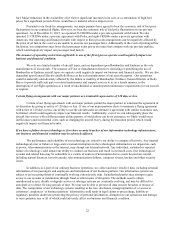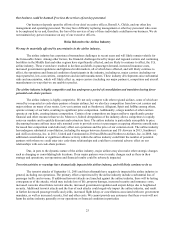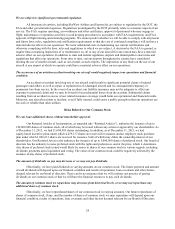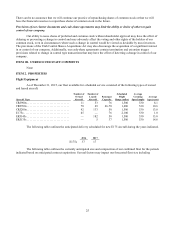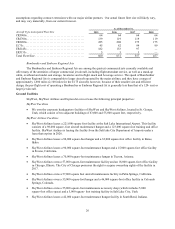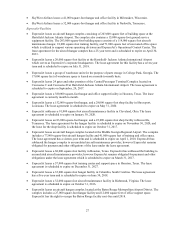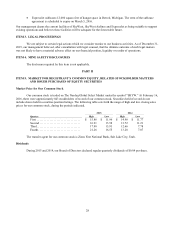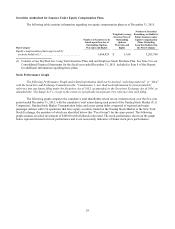SkyWest Airlines 2015 Annual Report Download - page 23
Download and view the complete annual report
Please find page 23 of the 2015 SkyWest Airlines annual report below. You can navigate through the pages in the report by either clicking on the pages listed below, or by using the keyword search tool below to find specific information within the annual report.19
Disagreements regarding the interpretation of our code-share agreements with our major partners could have an
adverse effect on our operating results and financial condition.
Long-term contractual agreements, such as our code-share agreements, are subject to interpretation and disputes
may arise under such agreements if the parties to an agreement apply different interpretations to that agreement. Those
disputes may divert management time and resources from the core operation of the business, and may result in litigation,
arbitration or other forms of dispute resolution.
In recent years we have experienced disagreements with our major partners regarding the interpretation of
various provisions of our code-share agreements. Some of those disagreements have resulted in litigation, and we may be
subject to additional disputes and litigation in the future. Those disagreements have also required a significant amount of
management time, financial resources and settlement negotiations of disputed matters.
To the extent that we continue to experience disagreements regarding the interpretation of our code-share or
other agreements, we will likely expend valuable management time and financial resources in our efforts to resolve those
disagreements. Those disagreements may result in litigation, arbitration, settlement negotiations or other proceedings.
Furthermore, there can be no assurance that any or all of those proceedings, if commenced, would be resolved in our
favor. An unfavorable result in any such proceeding could have adverse financial consequences or require us to modify
our operations. Such disagreements and their consequences could have an adverse effect on our operating results and
financial condition.
We may be limited from expanding our flying within the Delta and United flight systems.
Additional growth opportunities within the Delta and United flight systems are limited by various factors
including a limited number of regional aircraft each major partner can operate in its regional network due to its own
labor agreements. Except as contemplated by our existing code-share agreements, we cannot assure that Delta and
United will contract with us to fly any additional aircraft. We may not receive additional growth opportunities, or may
agree to modifications to our code-share agreements that reduce certain benefits to us in order to obtain additional
aircraft, or for other reasons. Given the competitive nature of the airline industry, we believe that some of our
competitors may be more inclined to accept reduced margins and less favorable contract terms in order to secure new or
additional code-share operations. Even if we are offered growth opportunities by our major partners, those opportunities
may involve economic terms or financing commitments that are unacceptable to us. Additionally, our major partners
may reduce the number of regional jets in their system by not renewing or extending existing flying arrangements with
regional operators. Any one or more of these factors may reduce or eliminate our ability to expand our flight operations
with our existing code-share partners. We also cannot provide any assurance that we will be able to obtain the additional
ground and maintenance facilities, including gates, and support equipment, to expand our operations. The failure to
obtain these facilities and equipment would likely impede our efforts to implement our business strategy and could
materially and adversely affect our operating results and our financial condition.
Our business model depends on major airlines, including Delta and United, electing to contract with us instead
of operating their own regional jets. Some major airlines own their own regional airlines or operate their own regional
jets instead of entering into contracts with regional carriers. We have no guarantee that in the future our code-share
partners will choose to enter into contracts with us instead of operating their own regional jets. Our partners are not
prohibited from doing so under our code-share agreements. A decision by Delta or United to phase out code-share
relationships and instead acquire and operate their own regional jets could have a material adverse effect on our financial
condition, results of operations or the price of our common stock.
Reduced utilization levels of our aircraft under our code-share agreements would adversely impact our financial
results.
The majority of our code-share agreements set forth minimum levels of flight operations which our major
partners are required to schedule for our operations and we are required to provide. These minimum flight operating
levels are intended to compensate us for reduced operating efficiencies caused by production decreases made by our
major partners under our respective code-share agreements. Historically, our major partners have utilized our flight
operations at levels which exceed the minimum levels set forth in our code-share agreements, however, higher fuel costs


